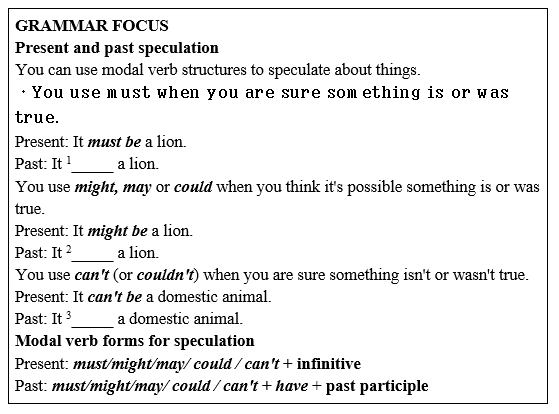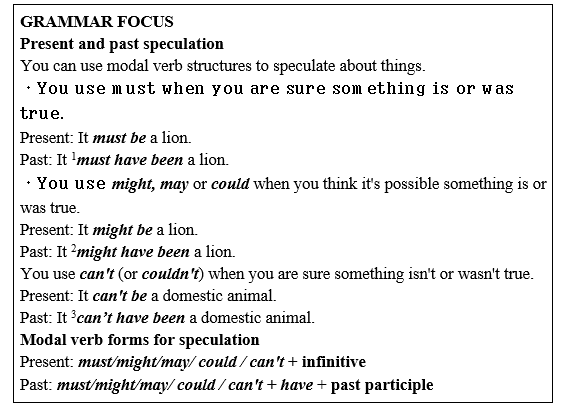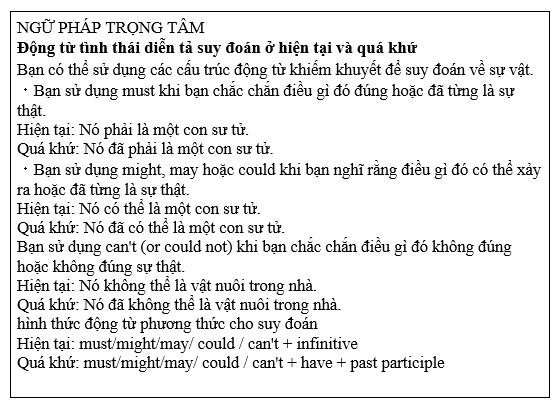Tiếng Anh 11 Unit 6 6.2 Grammar1. Look at the pictures and complete the sentences. 2. Read the short newspaper article. Are statements 1-3 true (T) or false (F)?3. Read the GRAMMAR FOCUS and complete the examples with the verb forms in blue in the article. 4. Complete the sentences with an appropriate modal structure and the verb in brackets. 5. Choose a sentence below and write a dialogue including the sentence. Then act out your dialogue to the class.
Lựa chọn câu để xem lời giải nhanh hơn
Bài 1 Present and past speculation (Động từ tình thái diễn tả suy đoán ở hiện tại và quá khứ) I can use modal verbs to speculate about the present and the past. (Tôi có thể sử dụng các động từ khuyết thiếu để suy đoán về hiện tại và quá khứ.) 1. Look at the pictures and complete the sentences. (Hãy nhìn vào bức tranh và hoàn thành những câu sau đây.) 1. Picture ____ must be a lion because of the long hair around the head and neck. 2. Picture ____ might be a puma or it could be a cheetah. 3. Picture ____ can't be a tiger because the head is too small. Lời giải chi tiết: 1. Picture C must be a lion because of the long hair around the head and neck. (Hình C chắc là sư tử vì có lông dài quanh đầu và cổ.) 2. Picture A might be a puma or it could be a cheetah. (Hình A có thể là một con báo sư tử hoặc có thể là một con báo.) 3. Picture B can't be a tiger because the head is too small. (Hình B không thể là hổ vì đầu quá nhỏ.)
Bài 2 2. Read the short newspaper article. Are statements 1-3 true (T) or false (F)? (Đọc bài báo ngắn. Các câu 1-3 đúng (T) hay sai (F)?) 1. The man is sure he saw a lion. 2. The woman is sure she heard a lion. 3. The police are sure a lion escaped from a zoo. LION ON THE LOOSE IN ESSEX? On Sunday evening at 8.00 p.m., a holidaymaker was walking to his caravan with his eleven-year-old son when he believed he saw a lion. He told reporters, 'It was dark, but I could see a large animal. It can't have been a domestic animal it was too big. I thought it might have been a lion. So we ran, very quickly!' The seaside resort was full of holidaymakers and at least ten people saw the animal. One woman said 'I heard a loud roar at 10.00 p.m. It must have been a lion. No other animal can roar like that.' Police have told everybody to stay inside as they believe a lion may have escaped from a nearby zoo. Tạm dịch: SƯ TỬ NGOÀI VÒNG PHÁP LUẬT Ở ESSEX? Vào lúc 8 giờ tối Chủ nhật, một khách du lịch đang đi bộ đến đoàn lữ hành của mình cùng với đứa con trai mười một tuổi thì anh ta tin rằng mình đã nhìn thấy một con sư tử. Anh ấy nói với các phóng viên, 'Trời tối, nhưng tôi có thể nhìn thấy một con vật lớn. Nó không thể là một con vật nuôi trong nhà vì nó quá lớn. Tôi nghĩ nó có thể là một con sư tử. Thế là chúng tôi chạy, rất nhanh!' Khu nghỉ mát bên bờ biển có rất nhiều khách du lịch và ít nhất mười người đã nhìn thấy con vật. Một phụ nữ cho biết 'Tôi nghe thấy một tiếng gầm lớn lúc 10 giờ tối. Nó phải là một con sư tử. Không con vật nào khác có thể gầm như vậy.' Cảnh sát đã yêu cầu mọi người ở trong nhà vì họ tin rằng một con sư tử có thể đã trốn thoát khỏi vườn thú gần đó. Lời giải chi tiết: 1. The man is sure he saw a lion. F (Người đàn ông chắc chắn rằng anh ta đã nhìn thấy một con sư tử.) Thông tin: “On Sunday evening at 8.00 p.m., a holidaymaker was walking to his caravan with his eleven-year-old son when he believed he saw a lion.” (Vào lúc 8 giờ tối Chủ nhật, một khách du lịch đang đi bộ đến đoàn lữ hành của mình cùng với đứa con trai mười một tuổi thì anh ta tin rằng mình đã nhìn thấy một con sư tử.) 2. The woman is sure she heard a lion. T (Người phụ nữ chắc chắn rằng cô ấy đã nghe thấy một con sư tử.) Thông tin: “ One woman said 'I heard a loud roar at 10.00 p.m. It must have been a lion.” (Một phụ nữ cho biết 'Tôi nghe thấy một tiếng gầm lớn lúc 10 giờ tối. Nó phải là một con sư tử.) 3. The police are sure a lion escaped from a zoo. F Thông tin: “Police have told everybody to stay inside as they believe a lion may have escaped from a nearby zoo.” (Cảnh sát đã yêu cầu mọi người ở trong nhà vì họ tin rằng một con sư tử có thể đã trốn thoát khỏi vườn thú gần đó.) Bài 3 3. Read the GRAMMAR FOCUS and complete the examples with the verb forms in blue in the article. (Đọc NGỮ PHÁP TRỌNG TÂM và hoàn thành các ví dụ với các dạng động từ được tô màu xanh lam trong bài viết.)
Lời giải chi tiết:
Tạm dịch:
Bài 4 4. Complete the sentences with an appropriate modal structure and the verb in brackets. (Hoàn thành các câu với cấu trúc tình thái thích hợp và động từ trong ngoặc.) 1. Dave can't have left yet, his coat is still here. (not yet leave) (Dave chưa thể rời đi, áo khoác của anh ấy vẫn ở đây. (chưa rời đi)) 2. The traffic's really bad, I'm worried we ________ our train. (miss) 3. They're not at home. They ________ away for the weekend. (go) 4. I can't find Jo. She ________ home. (go) 5. The plane landed over an hour ago. Bill ________ in baggage reclaim. (not still be) 6. Buy a laptop? With my pocket money?! You ________ serious. (not be) Lời giải chi tiết: 2. The traffic's really bad, I'm worried we might miss our train. (miss) (Giao thông rất tệ, tôi lo là chúng ta có thể lỡ chuyến tàu.) 3. They're not at home. They may have gone away for the weekend. (go) (Họ không ở nhà. Họ có thể đã đi xa vào cuối tuần.) 4. I can't find Jo. She might have gone home. (Tôi không thể tìm thấy Jo. Cô ấy có thể đã về nhà.) 5. The plane landed over an hour ago. Bill can’t have been still in baggage reclaim. (not still be) (Máy bay đã hạ cánh hơn một giờ trước. Bill không thể vẫn còn trong việc nhận lại hành lý.) 6. Buy a laptop? With my pocket money?! You mustn’t be serious. (not be) (Mua máy tính xách tay? Với túi tiền của tôi?! Bạn có nghiêm túc không vậy.) Bài 5 5. Choose a sentence below and write a dialogue including the sentence. Then act out your dialogue to the class. (Chọn một câu dưới đây và viết một đoạn hội thoại bao gồm câu đó. Sau đó diễn lại cuộc đối thoại của bạn trước lớp.) 1. must have left it in the shop. (chắc đã để quên ở tiệm rồi.) 2. You might have hurt yourself! (Bạn có thể đã làm tổn thương chính mình!) 3. You must be joking! (Chắc bạn đùa thôi nhỉ?) 4. I can't have left it them at home. (Tôi không thể để nó ở nhà.) 5. There must be some mistake. (Phải có một số nhầm lẫn.) A: Oh no! B: What's wrong? A: I can't find my wallet. I must have left it in the shop. B: Oh dear. Never mind. Let's go back and look for it. (A: Ôi không! B: Chuyện gì vậy? A: Tớ không thể tìm thấy ví. Chắc tớ đã để quên ở tiệm rồi. B: Ôi trời, đừng lo. Hãy quay lại và tìm nó nào.) Lời giải chi tiết: A: Haizz, I got a bad mark on the History exam. B: Poor you. Did you prepare anything for that exam? A: Yes, I spent a week and I believed I learnt everything by heart. B: There must be some mistake. Don’t worry, you can try better next time. (A: Haizz, tớ bị điểm kém trong bài kiểm tra Lịch sử. B: Tội nghiệp cậu. Cậu đã chuẩn bị gì cho kỳ thi đó? A: Có, tớ đã dành một tuần và tớ tin rằng mình đã học thuộc mọi thứ. B: Chắc có nhầm lẫn gì đó. Đừng lo lắng, cậu có thể cố gắng tốt hơn vào lần sau.)
|
















